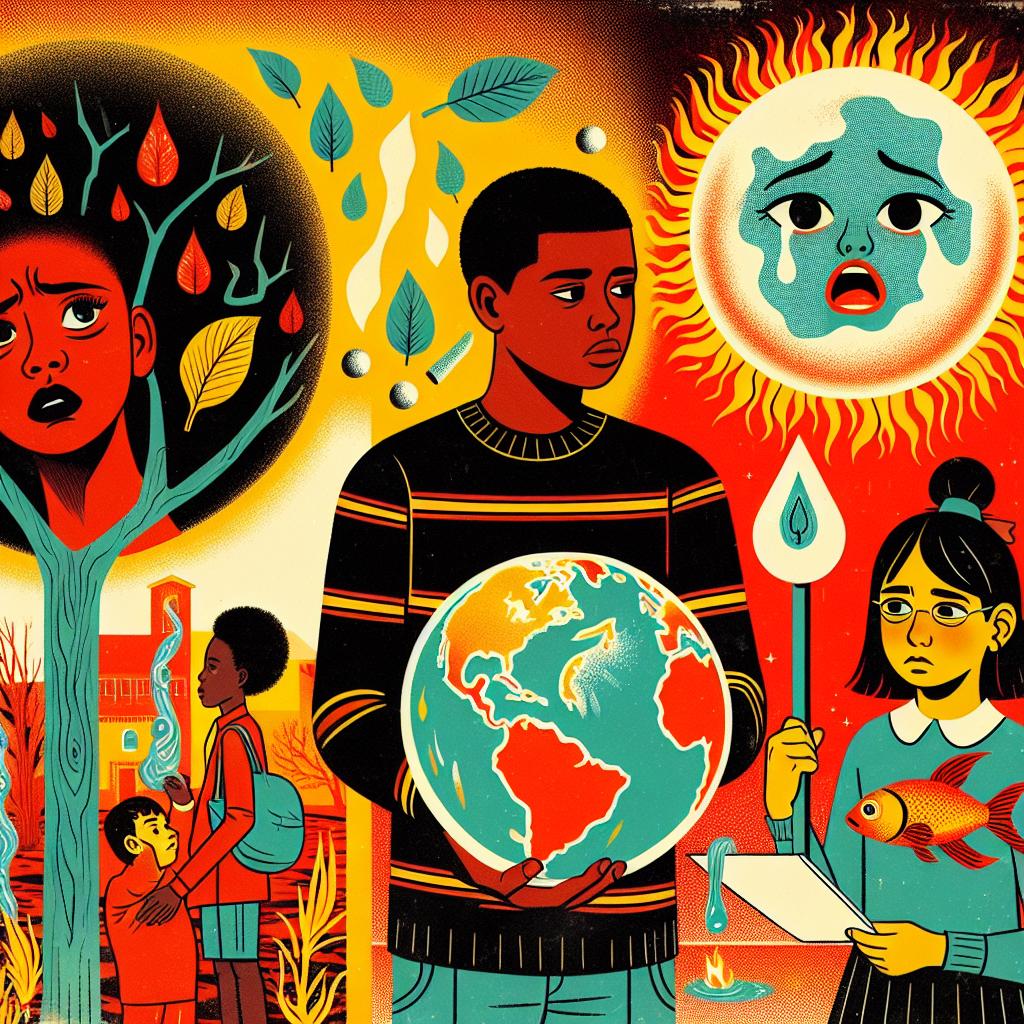The Rising Tide of Climate Anxiety
In an era where dystopian narratives about climate change permeate the news cycle, soaring temperatures become a daily conversation, and extreme weather events plague our global community, it is no wonder that climate anxiety has emerged as a pressing mental health concern. Particularly among younger generations, this anxiety is not merely a fleeting emotion; it represents a genuine psychological phenomenon that could impact them long into adulthood.
Studies indicate that significant portions of youth are engaging in intense worry about the future of our planet. Reports reveal that up to 60% of young people experience substantial anxiety related to climate change, impacting their emotional well-being and overall quality of life. But what does this emotional toll entail?
The Deep Seated Fears of Youth
For many young individuals, the effects of climate change feel more urgent than ever. From raging wildfires in California to deadly floods in Europe, the visible manifestations of climate change foster a deep-seated fear—not just about the environment, but also about jobs, health, and future prospects. Younger generations are raised awareness of these issues, often leading to overwhelming feelings of helplessness.
As the definition of youth shifts—from the naive carefree days often attributed to childhood into an age marked by existential worry—people can relate to social pressures surrounding climate change. This generation, known as Gen Z, is often characterized as engaged, socially aware, and activist-minded. Yet with this awareness comes a burden: grief for the planet, anxiety for the future, and a pervasive uncertainty about what lies ahead. The mental health stakes could not be higher.
Therapeutic Approaches to Climate Anxiety
Given the unique aspects of climate anxiety, mental health professionals are developing innovative frameworks to both recognize and address it. This includes the realm of psychotherapy where therapists are blending traditional cognitive-behavioral techniques with climate-sensitive strategies.
Some therapists describe using ‘eco-therapy’—a form of therapy that incorporates the outdoors into healing concepts—while others focus on promoting actionable responses, teaching young people how to channel crucial feelings of anxiety into constructive behaviors such as environmental activism. Techniques are also being developed to educate clients about acceptance and mindfulness when it comes to feelings of uncertainty.
https://img-h0ster.s3.us-west-2.amazonaws.com/civicmag/348_content.jpg
Through these steps, therapists aim to empower young people, combining individual coping mechanisms with group understanding, thereby normalizing this emotional experience. Coping with climate anxiety has become a therapeutic journey just as much as dealing with any other form of psychical disturbance.
Rethinking the Narrative Surrounding Climate Anxiety
We often hear about climate change through lens of bleak statistics and frightening projections—a discourse increasingly prevalent among this younger cohort. But rethinking the narrative around climate anxiety could facilitate healthier dialogues. Rather than framing it strictly as a foreboding mental health crisis, a closer examination of the collective psyche can reveal deeper empathy and calls for innovation.
In engaging with climate anxiety, mental health practitioners and educators could work together, creating narratives that emphasize resilience—as opposed to despair. Educating young people about their role in local and global contexts could funnel fear into hope, anxiety into action.
The Cost of Inaction: Societal Implications
Failure to address climate anxiety’s psychological implications does not solely impact the emotional health of individuals; it has the potential to ripple outwards, affecting society as a whole. Mental health disparities can translate into broader sociological challenges, such as increased healthcare costs, diminished workforce participation, and social disintegration.
The ramifications of climate anxiety can thus expand beyond personal realms, indicating important revisions in public health policies. Community resources, for instance, must adapt by implementing systems that respond to the unique mental health needs linked to climate-induced stressors.
Creating a Collective Consciousness
The crux of tackling climate anxiety lies not only within individual mitigation strategies but rather through cultivating a collective consciousness around this issue. Intergenerational dialogues that engage both older and younger generations can reframe understanding and coping mechanisms while fostering realistic optimism based on community unity.
Emphasizing shared experiences could elicit an increased sense of cohesion, melding vulnerability with resilience, allowing for discussions that may ease the worries of youth through mutual engagement. When students see that the elders in their lives acknowledge and validate their emotions, it bridges the generational gap and potentially leads to proactive engagement.
A Path Forward
As we navigate this complex emotional terrain, the onus falls on both caregivers and society as a whole. Attempts to address climate anxiety must be positioned at the intersection of environmental awareness and mental health advocacy. Clinical approaches shouldn’t merely mitigate suffering but should inspire shared reflection and action, allowing a panoply of solutions to arise from a community united to restore balance in the psychological as well as environmental sense.
This challenge of climate change requires healing on many fronts, including our emotional well-being. For the youth bearing the weight of these challenges, collaborative initiatives may prove essential for advancing dialogues that bring healing in their wake.



